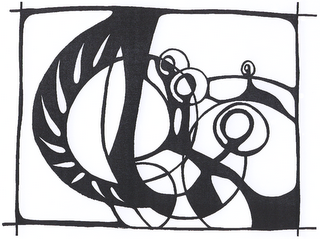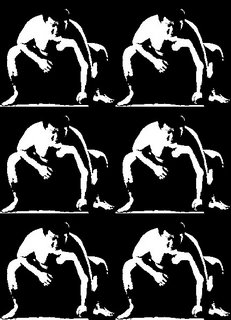I mean, what would some parent say to his kid if the kid came home with a glass eye, a Charlie Mingus record and a pocketful of feathers? He'd say, 'Who are you following?' And the poor kid would have to stand there with water in his shoes, a bow tie on his ear and soot pouring out of his belly button and say, 'Jazz. Father, I've been following jazz.'
Thursday, June 29, 2006
Unlikely messiah
Bob Dylan rarely leans over his front fence. And though he's got messy hair, he's always been an unlikely messiah (of folk music anyway).
Wednesday, June 14, 2006
Udo Bolts (GER)
Soon the world's attention will turn from the heavily-branded carnival that is World Cup Football to the MOST HEAVILY BRANDED SPORTING PHENOMENON IN THE UNIVERSE: the Tour de France. I love this event for thousands of reasons (including the gladiatorial mountain climbing contests between EPO-addled supermen). But I have a special interest in the diversity of competitors' names. Here's a selection from last year's installment:
Axel Merckx (BEL)
Georg Totschnig (AUT)
Inaki Isasi (SPA)
Dario Frigo (ITA)
Maxim Iglinski (KAZ)
Pietro Caucchioli (ITA)
Laszlo Bodrogi (HUN)
Joost Posthuma (NED)
Haimar Zubeldia (SPA)
Vladimir Karpets (RUS)
Beat Zberg (SWI)
Wim Vansevenant (BEL)

Axel Merckx (BEL)
Georg Totschnig (AUT)
Inaki Isasi (SPA)
Dario Frigo (ITA)
Maxim Iglinski (KAZ)
Pietro Caucchioli (ITA)
Laszlo Bodrogi (HUN)
Joost Posthuma (NED)
Haimar Zubeldia (SPA)
Vladimir Karpets (RUS)
Beat Zberg (SWI)
Wim Vansevenant (BEL)

Saturday, June 10, 2006
Friday, June 09, 2006
Ruined station house
Well, it was on the old Ghan line . . . but I suppose it might have belonged to BT the nomad or his brother FRASER, the retired mill worker.
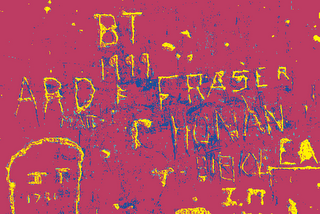

Thursday, June 08, 2006
Wednesday, June 07, 2006
Emiliana Torrini is the fisherman's woman
Don't know if the last line of this song includes the words "my saver". The transcription was pretty straight forward apart from the last line. In a softer state of mind, I might imagine that my inability to capture this particular lyric is symbolic of something - e.g. I can't hear my saver or, worse, I can hear something but I'm not sure that it's my saver . . .
Lifesaver, your timing's really strange
Catch me later
But can you please be late
And it's funny how your thoughts
Think they're right at all
And its funny how your cause
Makes no sense at all
Lifesaver, let's play a little game
Catch me later
But make sure you be there late
And it's funny how it seems
You're doing things
And its funny how you find
Your peace of mind
Lifesaver, I'm cancelling our date
Lifesaver, its time you had a break
Lifesaver, I'm cancelling our date
Lifesaver, my saver
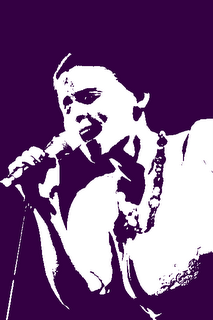
Lifesaver, your timing's really strange
Catch me later
But can you please be late
And it's funny how your thoughts
Think they're right at all
And its funny how your cause
Makes no sense at all
Lifesaver, let's play a little game
Catch me later
But make sure you be there late
And it's funny how it seems
You're doing things
And its funny how you find
Your peace of mind
Lifesaver, I'm cancelling our date
Lifesaver, its time you had a break
Lifesaver, I'm cancelling our date
Lifesaver, my saver

Monday, June 05, 2006
Who has the perfect face?
Researchers at the Perception Lab (echo echo) have used the judgements of a group of 34 young women to generate a composite image of the perfect male face. Tony Little, the principal research psychologist at said lab:
Now there's a trap for young players.
Picture a man, a slightly weepy character, who is young for his age and has a twitchy eyelid. This man has made a routine out of nibbling on bits of cake and fingering his ears while mumbling to himself in the company canteen at lunchtime.
Deep down he knows the truth: whatever revision of his personal history can be achieved by cake-fueled ear excavation will always, in the end, be overridden by the fact that on every day at school his sandwiches were taken from him by Bull Thompson, soaked in urine, and, moments before the bell, smeared in his face.
At university, this boy almost failed his first year of animal behaviour science because he was addicted to muscle milk and four different varieties of thermogenic fat burner. He hauled weights around his mother's walk-in wardrobe till four in the morning, six nights a week. He wolfed strange powders and pills with his banana porridge. He even pasted theatre hair above his lip to conceal an expanding fuzz of bum fluff. He paid particular attention to sculpting his face in the manner of a Schwarzenegger, a Pearce, a Brereton or, on some confusing days, all three at the same time. No amount of drug-enraged screaming from his sister (who only wore her Howard Cunningham mask inside the house) distracted him from his late-afternoon vanity mirror ritual of prodding and reshaping, twisting, tugging, kneading and hoping that it'd all be worthwhile in the end, that it'd all make him absolutely irresistible to the opposite sex . . . in the end.
But before it got too hard, he discovered god, bought a skateboard that he never used and moved in with his psychiatrist's dog obedience trainer.



Women find femininity appealing in a male face because they said they associate it with co-operation, honesty and parental ability. Strongly masculine features are considered threatening and less attractive, but they still want some combination involving masculine features because they want dominance, too.
Now there's a trap for young players.
Picture a man, a slightly weepy character, who is young for his age and has a twitchy eyelid. This man has made a routine out of nibbling on bits of cake and fingering his ears while mumbling to himself in the company canteen at lunchtime.
Deep down he knows the truth: whatever revision of his personal history can be achieved by cake-fueled ear excavation will always, in the end, be overridden by the fact that on every day at school his sandwiches were taken from him by Bull Thompson, soaked in urine, and, moments before the bell, smeared in his face.
At university, this boy almost failed his first year of animal behaviour science because he was addicted to muscle milk and four different varieties of thermogenic fat burner. He hauled weights around his mother's walk-in wardrobe till four in the morning, six nights a week. He wolfed strange powders and pills with his banana porridge. He even pasted theatre hair above his lip to conceal an expanding fuzz of bum fluff. He paid particular attention to sculpting his face in the manner of a Schwarzenegger, a Pearce, a Brereton or, on some confusing days, all three at the same time. No amount of drug-enraged screaming from his sister (who only wore her Howard Cunningham mask inside the house) distracted him from his late-afternoon vanity mirror ritual of prodding and reshaping, twisting, tugging, kneading and hoping that it'd all be worthwhile in the end, that it'd all make him absolutely irresistible to the opposite sex . . . in the end.
But before it got too hard, he discovered god, bought a skateboard that he never used and moved in with his psychiatrist's dog obedience trainer.



Saturday, June 03, 2006
"I don't know where it all came from / I think I dreamed about my home" - Grand Salvo (aka Paddy Mann)
This picture is intended to be ugly. It kind of says something about the city, about the city's brain, about my brain, A BRAIN, that can fragment without warning and inhabit hundreds of little pokey compartments and sub-compartments that are damp and cold and don't have any toilets. Each place has many dimensions and can be seen from many perspectives. Each place is filled with the chatter of peculiar voices and the fleetingness of peculiar faces -- if I let myself think that way.
I don't want to think that way, not all the time anyway. And yet some days the will to rise above the tangled-up metropolitan world, the desire also, is just so hard to draw on.
Somehow, if only obliquely, Paddy Mann captures this. His words are beautiful: "It's like knowing a language that nobody speaks / or building a house where no one will live / it's the work of a lifetime that no one will read ... I remember when we used to sit / And the silence would be so complete and so sweet."

I don't want to think that way, not all the time anyway. And yet some days the will to rise above the tangled-up metropolitan world, the desire also, is just so hard to draw on.
Somehow, if only obliquely, Paddy Mann captures this. His words are beautiful: "It's like knowing a language that nobody speaks / or building a house where no one will live / it's the work of a lifetime that no one will read ... I remember when we used to sit / And the silence would be so complete and so sweet."

Thursday, June 01, 2006
Friday, May 26, 2006
Saturday, May 20, 2006
John Howard's boss
It's not every day you meet the Governor General, not on half-returned Aboriginal land anyway. I'm pleased to say that I recently had this honour. I shook His Excellency's hand and called him mate at a place called Iga Warta* in the Northern Flinders Ranges. He was on a ten-day jam-packed promotional tour of the outback which would pass through Birdsville, Charleville and Longreach, having already paused at Port Augusta and Wilpena. Among an entourage of 11 persons (according to the Herald Sun, and not including media reps) was a vice regal physiotherapist, whose job, I can only assume, was to keep the former SAS commander's body limber so that he could move from admiring subject to deferential subject secure in the knowledge that if he should slip a disc or pull a hamstring, a deep tissue massage would be only a yelp away. No one would know better than the distinguished Military Cross awardee and former resident of Wiluna just how physically demanding it can be to shake the hands of unwashed well-wishers while offering them tedious anodyne platitudes about values, prosperity and cultural understanding.
Of course, the size of the entourage was entirely fitting for the Queen's antipodean milk monitor. There was a small (but muscular) posse of police and army personnel, a clutch of pointy-faced minions, Ted Egan, Ted Egan's wife and some born-to-rule-looking kids wearing moleskins and expensive riding boots.
Fair enough I don't hear tax-paying republicans say. But a physiotherapist?
That said, he was quite a nice bloke.
* A settlement within Nantawarrina, the first (SA) Indigenous Protected Area, declared in August 1998.

Of course, the size of the entourage was entirely fitting for the Queen's antipodean milk monitor. There was a small (but muscular) posse of police and army personnel, a clutch of pointy-faced minions, Ted Egan, Ted Egan's wife and some born-to-rule-looking kids wearing moleskins and expensive riding boots.
Fair enough I don't hear tax-paying republicans say. But a physiotherapist?
That said, he was quite a nice bloke.
* A settlement within Nantawarrina, the first (SA) Indigenous Protected Area, declared in August 1998.

Friday, May 05, 2006
More than can be imagined
Richard Dawkins explains that for beavers, dam-building is hard wired in the brain.
It is also true that if you leave a politician in a cage, he will eventually start to build a constituency out of thin air. He may even go as far as to manipulate the phantom relationships he has conjured to become a sort of pathetic dictator, a father of thin air.
I have seen a remarkable film of captive beavers imprisoned in a bare, unfurnished cage, with no water and no wood. The beavers enacted, 'in a vacuum', all the stereotyped movements normally seen in natural building behaviour when there is real wood and real water. They seem to be placing virtual wood into a virtual dam wall, pathetically trying to build a ghost wall with ghost sticks, all on the hard, dry, flat floor of their prison. One feels sorry for them: it is as if they are desperate to exercise their frustrated dam-building clockwork.
It is also true that if you leave a politician in a cage, he will eventually start to build a constituency out of thin air. He may even go as far as to manipulate the phantom relationships he has conjured to become a sort of pathetic dictator, a father of thin air.
Friday, April 28, 2006
The hidden effects of global warming
I was thinking today about a person who used to hide liquorice allsorts in her glove box. But (sigh) global warming has stopped all that.






Wednesday, April 26, 2006
It used to have class
I spotted a review on the weekend of a book called Striptease: the Untold History of the Girlie Show. Of course, before reading anything I arranged for a priest to sit beside me, mash his rosaries, rock backwards and forwards, catch globs of milky vomit in his mouth and sermonise interminably about blind people with "overworked fertility instruments" (in his case "futility", I jested). But when, eventually, I was permitted to read the sinful bits of the review free of millennia of trans-generational guilt (he fell asleep), I was quite taken by the following description of a couple of old time burlesque acts:
Move aside Sam Kekovich. Fearsome and funny animals, scantily clad women and meat. I see a whole new concept in vegetarian vilification. And good on you Tweaky and Squeaky! If you were alive today, you could have shown Bubbles a good time (bless him).
Blaze Starr tied small pieces of steak to her bra and panties before allowing a black panther to slink onstage to nibble them off. Diane Ross ... did an act in which her pet monkeys, Tweaky and Squeaky, took off her clothes, and sometimes their own.
Move aside Sam Kekovich. Fearsome and funny animals, scantily clad women and meat. I see a whole new concept in vegetarian vilification. And good on you Tweaky and Squeaky! If you were alive today, you could have shown Bubbles a good time (bless him).
Monday, April 24, 2006
Saturday, April 22, 2006
KP, a dangerous love
Huddling past your big house
Doubling on their craving
While you who have it all
Gnaw their last life saving
Blackeyed and breathing
Slavering on their (good) name
While you who have it all
Stalk their unsouled shame
But a back will turn eventually
On perimeters and stone
While you who have it all
FLAILHOOT their hunt to own
And a fire will feed eventually
On greedy little feet
While you who have it all
Burn them off your street
Doubling on their craving
While you who have it all
Gnaw their last life saving
Blackeyed and breathing
Slavering on their (good) name
While you who have it all
Stalk their unsouled shame
But a back will turn eventually
On perimeters and stone
While you who have it all
FLAILHOOT their hunt to own
And a fire will feed eventually
On greedy little feet
While you who have it all
Burn them off your street
Friday, April 21, 2006
Glyphs in space
Imagine a place where everyone is known by a single letter or symbol. Imagine coastal nursing homes filled to bursting with reconstructed battlers dying slowly of affluenza, all or most of them still choosing to be known as "I".
Uranus's symbol is upside down, surely, and Pluto's, fittingly enough*, looks like a pre-teen protesting about the cold. My favourite is the moon's, obviously.

This reminds me of a spirited (read sad) discussion I once had with a group of friends about the personalities, mannerisms, morals, lifestyles etc. of each letter of the English alphabet. I won't go into the details but I remember getting particularly passionate about the letter "E". This was a conniving little fellow, I argued, who was always looking for an advantage and never respected other letters simply for who they were.
Changing the subject, here is more of the devil spawn Yogi Logo warned me about. Lunar Brogue, projected onto spheres and shot into deep space. Don't know why my bedside radio caught fire this morning. Or perhaps it was all in my head.

* Just before you have your milk . . . "Since Pluto is the furthest, darkest, coldest planet, it was given the name of the god of the underworld, where the Romans thought the souls of the dead went after they died. The name also honours Percival Lowell, who was responsible for the search for the new planet. (Sadly, however, Lowell's search was unsuccessful as he suffered a rare illness called Ingemar Syndrome which prevented him from distinguishing with any consistency between planets and tennis balls.)"
Uranus's symbol is upside down, surely, and Pluto's, fittingly enough*, looks like a pre-teen protesting about the cold. My favourite is the moon's, obviously.

This reminds me of a spirited (read sad) discussion I once had with a group of friends about the personalities, mannerisms, morals, lifestyles etc. of each letter of the English alphabet. I won't go into the details but I remember getting particularly passionate about the letter "E". This was a conniving little fellow, I argued, who was always looking for an advantage and never respected other letters simply for who they were.
Changing the subject, here is more of the devil spawn Yogi Logo warned me about. Lunar Brogue, projected onto spheres and shot into deep space. Don't know why my bedside radio caught fire this morning. Or perhaps it was all in my head.

* Just before you have your milk . . . "Since Pluto is the furthest, darkest, coldest planet, it was given the name of the god of the underworld, where the Romans thought the souls of the dead went after they died. The name also honours Percival Lowell, who was responsible for the search for the new planet. (Sadly, however, Lowell's search was unsuccessful as he suffered a rare illness called Ingemar Syndrome which prevented him from distinguishing with any consistency between planets and tennis balls.)"
Thursday, April 20, 2006
Yogi Logo, the people's prophet
Most people who buy into them (and don't we all) seem to be happy. I asked the Yogi and he said this is not true. He said people are fools and cannot be told. He said that they are being used by The Brand to promote unattainable ideals. He sold me a t-shirt which read "People are Fools and Cannot be Told". The dye runs but I'm too ashamed to do anything.
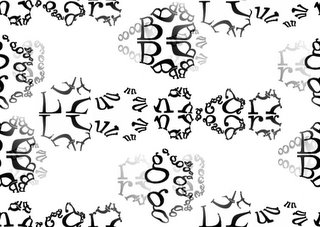

Sunday, April 09, 2006
Persecution peps the muse
Rosemary Neill interviewed a certain Bunyah resident for the Weekend Australian. Here's my take.
Les Murray, word contortionist and sometime preambler, was mercilessly bullied at school, "mostly at the hands of girls who sexually humiliated him". At the same time, when he was 12, his mother died. She was "tired of living after three consecutive miscarriages". And while for a time the boy was able to suppress the notion that his mother had chosen death over him, his mind eventually yielded, causing a nine year onslaught of depression that started when he was in his late 40's.
A symptom of this was what might be called persecution awareness (I'll avoid using the word anxiety) whose source, at least from the outside, was clear. Murray had never been shy in sharing his views on issues such as feminism, multiculturalism, aboriginal reconciliation etc. -- issues on which, it is fair to say, this country's cashmere horde has a strong consensus. Whether or not he cared about the establishment's unsympathetic attitude to his conservative opinions is a story I can't tell. But at the same time as the poet was being feted by the world's literary elite, he was convinced that he was hated: "I thought I had two or three friends in the world and that I was a national pariah".
And though he's mellowed a bit now, he's still an outsider, proud to be the bush bard bucking the the cultural norms of an arts community that has adopted him, begrudgingly mostly, as an errant yet magnificently talented country cousin.
This got me thinking. Maybe Murray has been enlivened by the freedom of his place beyond the boundary. A freedom which may owe its existence, ironically enough, to his persecution as a boy and later as an opinionated adult fulminating against the Australia Council and political correctness. His views about white Australians hiding their aboriginal ancestry, for example, are intriguing. "He calls the disguising of indigenous bloodlines by whites 'the great secret, covered up'". So interested is he in the possibility of a personal ancestral connection to aboriginal Australia, he's planning to undergo genetic testing!
Les Murray, word contortionist and sometime preambler, was mercilessly bullied at school, "mostly at the hands of girls who sexually humiliated him". At the same time, when he was 12, his mother died. She was "tired of living after three consecutive miscarriages". And while for a time the boy was able to suppress the notion that his mother had chosen death over him, his mind eventually yielded, causing a nine year onslaught of depression that started when he was in his late 40's.
A symptom of this was what might be called persecution awareness (I'll avoid using the word anxiety) whose source, at least from the outside, was clear. Murray had never been shy in sharing his views on issues such as feminism, multiculturalism, aboriginal reconciliation etc. -- issues on which, it is fair to say, this country's cashmere horde has a strong consensus. Whether or not he cared about the establishment's unsympathetic attitude to his conservative opinions is a story I can't tell. But at the same time as the poet was being feted by the world's literary elite, he was convinced that he was hated: "I thought I had two or three friends in the world and that I was a national pariah".
And though he's mellowed a bit now, he's still an outsider, proud to be the bush bard bucking the the cultural norms of an arts community that has adopted him, begrudgingly mostly, as an errant yet magnificently talented country cousin.
This got me thinking. Maybe Murray has been enlivened by the freedom of his place beyond the boundary. A freedom which may owe its existence, ironically enough, to his persecution as a boy and later as an opinionated adult fulminating against the Australia Council and political correctness. His views about white Australians hiding their aboriginal ancestry, for example, are intriguing. "He calls the disguising of indigenous bloodlines by whites 'the great secret, covered up'". So interested is he in the possibility of a personal ancestral connection to aboriginal Australia, he's planning to undergo genetic testing!
Saturday, April 08, 2006
Thursday, April 06, 2006
Accidentally ascetic
Now I know it's not proper for me to claim a word has buzz status just because I discovered it in some high brow magazine and thought it'd sound good at parties. And I accept that my insistence that such words ought to have special currency, despite what the rest of the world thinks, is a tad immature. But blame me for this indulgence: PREDISPOSED. My god, there was a time there where I couldn't walk straight without having faux-casually dropped this word at least a dozen times a day. Yes, and here comes the shopping trolley full of bricks, you might say I was addicted. Just like my father before me, who uses more superlative language than the entire Californian evangelical Christian community, I'm blind to evidence of danger until it smashes into my shins and makes me cry.
And addiction always equals danger. (Don't say "love". I really do mean always.)
Paul Bloom is a professor of psychology and linguistics at Yale. (He's also a powerful spruiker for the movement (atheism) that, in a modern world floating around in clouds of ambiguity, dare not speak it's name. But that's an aside.) As well as reminding his readers about the Nun Bun (a pastry that bears an "eerie resemblance to Mother Teresa"), Bloom argues that there are sound evolutionary reasons for belief in the supernatural (more specifically, religion). He begins his discussion by considering the difficult question of the "origin of religious belief". Here are a couple of appetisers.
(1) We have "adopted religion as an opiate, to soothe the pain of existence". Serving the purposes of a god, for example, fills peoples' otherwise chaotic and insignificant lives with meaning. (Overdoses are common, however, so check the instructions. Witness Tom Cruise's paranoia about satirical representations of his "religion".)
(2) Religion is a fraternity which brings people together, "giving them an edge over those who lack this social glue". Fraternal communities satisfy peoples' existential needs by fostering -- often ritualistically -- shared values and ideals. (This partly explains foreskin snipping and the unholy application of table tennis bats to teenage bible scholars' dirty little sinful botty bots.)
But is this enough to explain why "gods, souls, an afterlife, miracles, divine creation of the universe and so on [are] brought in"? Bloom answers in the negative. In fact, all that quelling of disorder anxiety and happy clapping can be done without the involvement of religion at all (think Disneyland). And this leads to the scene of a calamitous accident.
Bloom informs us that a large body of scientific evidence, much of it recently gathered, proves we are mistaken when we perceive "the world of objects as essentially separate from the world of minds". For many, this is a big problem whose complexities can inspire a lifetime of philosophical cave exploration. But for many psychologists and neuroscientists such complexities are cast aside with the bold claim that the mind is what the brain does.
So this is part of the accident. We have evolved to imagine phenomena that occupy a world beyond our natural circumstances. We do not equate our mental experiences with our physical ones because this is so absurdly counter-intuitive. In reality, however, we allow ourselves to be kidnapped by reality and forced to contemplate the interior of the boot of its car (while straining to hear a distant conversation about Jim Jones and the Peoples Temple). And it delights me to add that this comes as no surprise because, wait for it, we are biologically predisposed to support such ethereal imaginings.
The other part of the accident is a consequence of the first. The "natural-born dualism" Bloom describes not only enables us to "envision soulless bodies and bodiless souls" but causes "our system of social understanding [to] overshoot", which in turn causes us to "infer goals and desires where none exist".
I'll finish now with this fearless oversimplification of Bloom's argument: god is a product of the inherent (and inherently false) natural conception we all have (at least to begin with) of the separation of mind and body. We want him because we need him and we've got him because we've evolved to be pretty good at concocting him.
god, it all sounds so hopeless.
And addiction always equals danger. (Don't say "love". I really do mean always.)
Paul Bloom is a professor of psychology and linguistics at Yale. (He's also a powerful spruiker for the movement (atheism) that, in a modern world floating around in clouds of ambiguity, dare not speak it's name. But that's an aside.) As well as reminding his readers about the Nun Bun (a pastry that bears an "eerie resemblance to Mother Teresa"), Bloom argues that there are sound evolutionary reasons for belief in the supernatural (more specifically, religion). He begins his discussion by considering the difficult question of the "origin of religious belief". Here are a couple of appetisers.
(1) We have "adopted religion as an opiate, to soothe the pain of existence". Serving the purposes of a god, for example, fills peoples' otherwise chaotic and insignificant lives with meaning. (Overdoses are common, however, so check the instructions. Witness Tom Cruise's paranoia about satirical representations of his "religion".)
(2) Religion is a fraternity which brings people together, "giving them an edge over those who lack this social glue". Fraternal communities satisfy peoples' existential needs by fostering -- often ritualistically -- shared values and ideals. (This partly explains foreskin snipping and the unholy application of table tennis bats to teenage bible scholars' dirty little sinful botty bots.)
But is this enough to explain why "gods, souls, an afterlife, miracles, divine creation of the universe and so on [are] brought in"? Bloom answers in the negative. In fact, all that quelling of disorder anxiety and happy clapping can be done without the involvement of religion at all (think Disneyland). And this leads to the scene of a calamitous accident.
Bloom informs us that a large body of scientific evidence, much of it recently gathered, proves we are mistaken when we perceive "the world of objects as essentially separate from the world of minds". For many, this is a big problem whose complexities can inspire a lifetime of philosophical cave exploration. But for many psychologists and neuroscientists such complexities are cast aside with the bold claim that the mind is what the brain does.
So this is part of the accident. We have evolved to imagine phenomena that occupy a world beyond our natural circumstances. We do not equate our mental experiences with our physical ones because this is so absurdly counter-intuitive. In reality, however, we allow ourselves to be kidnapped by reality and forced to contemplate the interior of the boot of its car (while straining to hear a distant conversation about Jim Jones and the Peoples Temple). And it delights me to add that this comes as no surprise because, wait for it, we are biologically predisposed to support such ethereal imaginings.
The other part of the accident is a consequence of the first. The "natural-born dualism" Bloom describes not only enables us to "envision soulless bodies and bodiless souls" but causes "our system of social understanding [to] overshoot", which in turn causes us to "infer goals and desires where none exist".
I'll finish now with this fearless oversimplification of Bloom's argument: god is a product of the inherent (and inherently false) natural conception we all have (at least to begin with) of the separation of mind and body. We want him because we need him and we've got him because we've evolved to be pretty good at concocting him.
god, it all sounds so hopeless.
Tuesday, March 07, 2006
The beginning
Hello, hello, hello. Welcome to the world's 28 millionth blog. Of course this number is irrelevant because my blog is different. So no threat of obscurity there. Exactly how it is different, however, is yet to be discovered, but I believe in predeterminism, or did, so I'm confident I've got something to share that 27,999,999 other blogs haven't thought of yet.
Anyway, it would be great if you could spend a weekend carefully reading and re-reading everything written here, but I accept that you may be busy and unable to afford such a commitment. So please stay for as long as your peanut butter toast stays warm or until any pity you might have towards an insecure wannabe writer (not me) dissolves.
Most of what will follow, I have no doubt, will be fairly silly. Silliness is the zeitgeist that never really budges. It is the spirit of all times that sits there just beneath the surface of our political and social lives like an occasionally-loved fez in the costume trunk, inspiring people to behave in odd ways and say unexpected things. Often funny things, too. Pauline Hanson is a good example, except she went to prison which wasn't that funny (for her). Another one is iffy interpretations of our national story. Take those Australian flag endraped boys and girls at Anzac Cove last year. What history were they mindful of while blitzing out, beach-side, in the company of the Bee Gees? Stayin' alive indeed!
There is a problem for people who wish to combine silly observations with not-so-silly observations, and it's all about credibility. Clive James once mused -- and I'm paraphrasing shamelessly here -- that whimsical writing is hard to take seriously, even if it is satirical and has a deeper significance. But I don't care about that. Animal Farm was cute and charming and I'd happily read it to John Howard's grandchildren - if and when they arrive.
One last thing: this blog's name is not supposed to be that clever because though I speak moon it's a dying idiom and I'm not particularly taken by language history, less so astronomy. In fact, without wanting to generalise, the language of the universe, as well as its origins, is passe.
There is something in it though. Read on to see if you can detect traces of the ancient tongue amid a sometimes gentle sometimes raucous always transmuting cosmos of words, meanings and pretentiously surreal waffle masquerading as tasty allusions to god-knows-what (and he's promised never to tell).
Anyway, it would be great if you could spend a weekend carefully reading and re-reading everything written here, but I accept that you may be busy and unable to afford such a commitment. So please stay for as long as your peanut butter toast stays warm or until any pity you might have towards an insecure wannabe writer (not me) dissolves.
Most of what will follow, I have no doubt, will be fairly silly. Silliness is the zeitgeist that never really budges. It is the spirit of all times that sits there just beneath the surface of our political and social lives like an occasionally-loved fez in the costume trunk, inspiring people to behave in odd ways and say unexpected things. Often funny things, too. Pauline Hanson is a good example, except she went to prison which wasn't that funny (for her). Another one is iffy interpretations of our national story. Take those Australian flag endraped boys and girls at Anzac Cove last year. What history were they mindful of while blitzing out, beach-side, in the company of the Bee Gees? Stayin' alive indeed!
There is a problem for people who wish to combine silly observations with not-so-silly observations, and it's all about credibility. Clive James once mused -- and I'm paraphrasing shamelessly here -- that whimsical writing is hard to take seriously, even if it is satirical and has a deeper significance. But I don't care about that. Animal Farm was cute and charming and I'd happily read it to John Howard's grandchildren - if and when they arrive.
One last thing: this blog's name is not supposed to be that clever because though I speak moon it's a dying idiom and I'm not particularly taken by language history, less so astronomy. In fact, without wanting to generalise, the language of the universe, as well as its origins, is passe.
There is something in it though. Read on to see if you can detect traces of the ancient tongue amid a sometimes gentle sometimes raucous always transmuting cosmos of words, meanings and pretentiously surreal waffle masquerading as tasty allusions to god-knows-what (and he's promised never to tell).
Subscribe to:
Posts (Atom)



